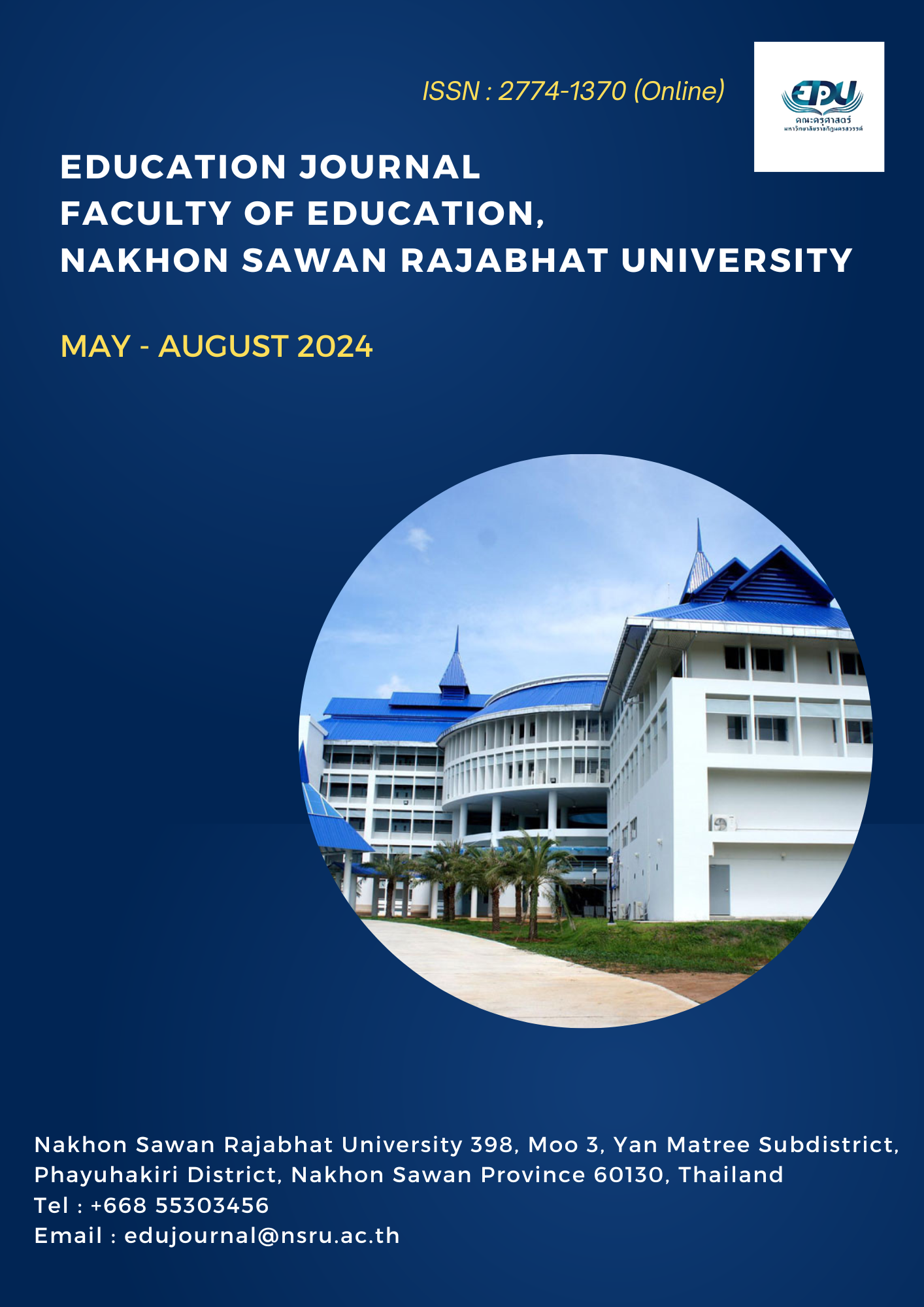Guidelines for Developing Teacher Competencies under the Office of Educational Service Areas Kamphaeng Phet Primary School, Area 1 in Mueang Kamphaeng Phet District
Main Article Content
Abstract
This research aims to 1) study the competencies and development challenges of teachers in educational institutions, 2) compare teacher competencies in educational institutions categorized by educational level, work experience, and school size, and 3) identify ways to develop teacher competencies in educational institutions. The sample group consists of teachers affiliated with the Office of Primary Education Area Kamphaeng Phet District 1 in the first semester of the academic year 2565, totaling 250 individuals. The sample group was selected using stratified random sampling. Data were collected through questionnaires and interviews, with a reliability coefficient of 0.94. Data analysis involved calculating means, standard deviations, and conducting a one-way analysis of variance. Research findings reveal that:
1) overall teacher competencies in educational institutions are at a high level, with the highest proficiency observed in ethical and professional morality and quality service, and the lowest in analysis, synthesis, and research for student development. 2) Comparisons of teacher competencies based on variables such as educational level and work experience showed no significant differences. However, differences were observed in school size, particularly between small and large schools, and medium and large schools. and 3) Recommendations for developing teacher competencies include promoting the analysis of the organizational environment and the SWOT analysis of the institution, planning tasks in operational plans, providing clear work instructions, organizing training programs, utilizing the PLC process, establishing suitable learning resources, and implementing effective monitoring and reporting mechanisms. Additionally, administrators should serve as role models in developing competencies for subordinates.
Downloads
Article Details

This work is licensed under a Creative Commons Attribution-NonCommercial-NoDerivatives 4.0 International License.
References
พิมพันธ์ เดชะคุปต์, และพรทิพย์ แข็งขัน. (2551). สมรรถนะครูและแนวทางการพัฒนาครูในสังคมที่เปลี่ยนไป. กรุงเทพฯ: พริกหวานกราฟฟิค.
ภูมิพิพัฒน์ รักพรมงคล. (2563). แนวทางพัฒนาภาวะผู้นำของผู้บริหารสถานศึกษาในการพัฒนาสถานศึกษาเป็นองค์กรแห่งการเรียนรู้. กำแพงเพชร: คณะครุศาสตร์, มหาวิทยาลัยราชภัฏกำแพงเพชร.
วนิดา ภูวนารถนุรักษ์. (2552). “สมรรถนะครูไทย,” รามคําแหง. 26(5): 61 – 71.
วิภาดา สารัมย์. (2562). การบริหารงานบุคคลของผู้บริหารสถานศึกษาในเขตพื้นที่การศึกษาประถมศึกษาปทุมธานี. ปทุมธานี: คณะครุศาสตร์อุตสาหกรรม, มหาวิทยาลัยเทคโนโลยีราชมงคลธัญญบุรี.
วัฒนา พัฒนพงศ์. (2555). การบริหารเพื่อมุ่งอนาคต. กรุงเทพฯ: ดอกหญ้า.
ศิริชัย กาญจนวาสี. (2559). ทฤษฎีการทดสอบแบบดั้งเดิม. (พิมพ์ครั้งที่ 6). กรุงเทพฯ: โรงพิมพ์แห่งจุฬาลงกรณ์มหาวิทยาลัย.
สำนักงานเขตพื้นที่การศึกษาประถมศึกษากำแพงเพชร เขต 1. (2565). ข้อมูลสารสนเทศทางการศึกษาประจำปีการศึกษา 2565. กำแพงเพชร: ผู้แต่ง.
สำนักงานคณะกรรมการข้าราชการพลเรือน. (2553). คู่มือการกำหนดสมรรถนะในราชการพลเรือน: คู่มือสมรรถนะหลัก. นนทบุรี: บริษัทประชุมช่าง จํากัด.
สำนักงานคณะกรรมการศึกษาขั้นพื้นฐาน, สำนักงานคณะกรรมการ. (2552). หลักเกณฑ์และวิธีการกระจายอำนาจ การบริหารและการจัดการศึกษา. กรุงเทพฯ: สำนักงานคณะกรรมการการศึกษาขั้นพื้นฐาน.
สำนักงานเลขาธิการสภาการศึกษา. (2560). แผนการศึกษาแห่งชาติ พ.ศ. 2560 – 2579. กรุงเทพฯ: พริกหวานกราฟฟิค.
Krejcie, R. V., & Morgan, D. W. (1970). Determining sample size of research activities. Education and Psychological Measurement. 30(3): 608-609.
McClelland, D. C. (1993). Test for competence rather than for intelligence. American Psychologist. 28: 1-14.
Spencer, L. M., & Spencer, S. M. (1993). Competence at work: Model for superior performance. New York: Wiley.


